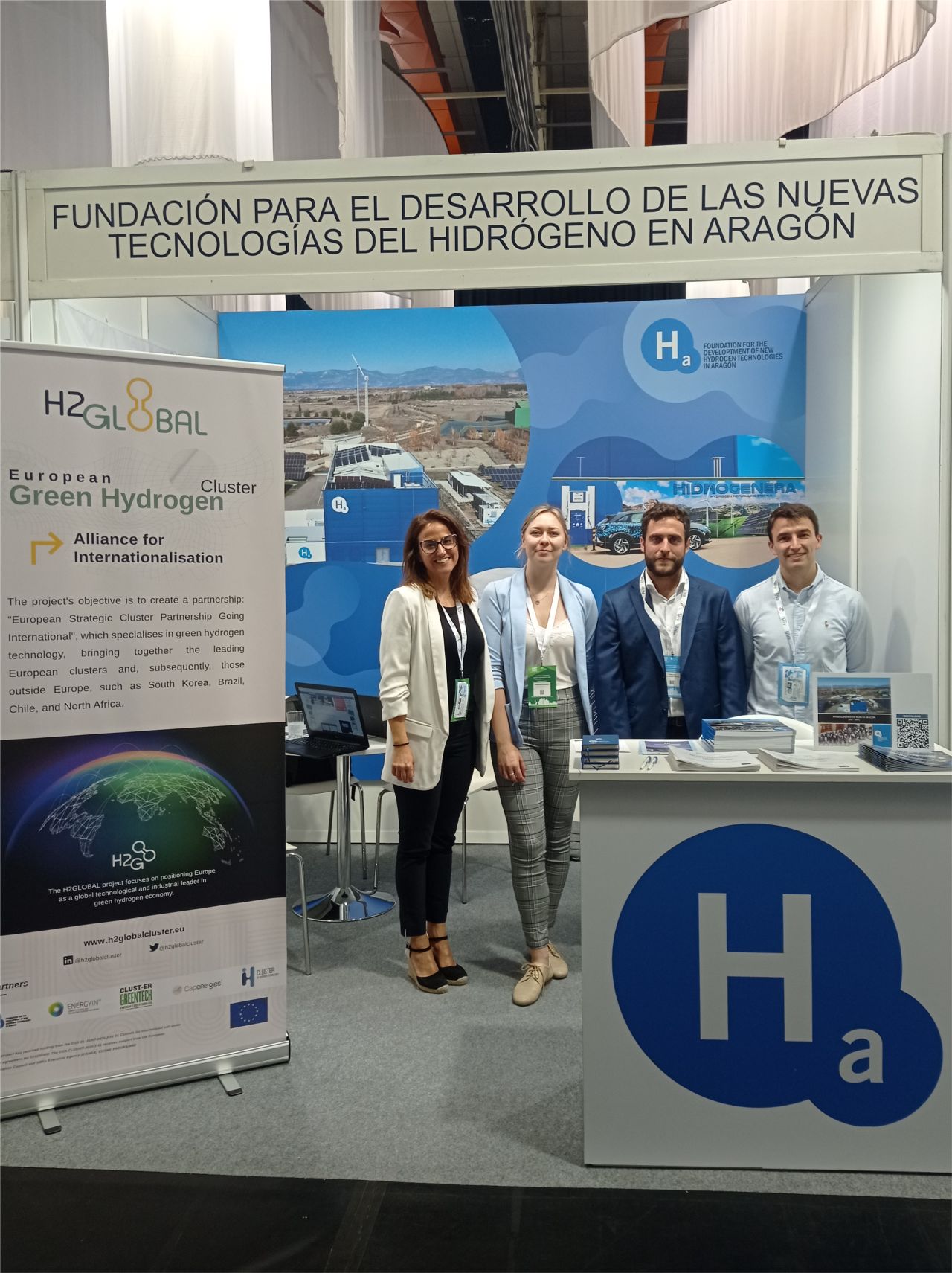Hydrogen Foundation in Aragon at EHEC 2022
The Hydrogen Foundation in Aragon (Fha) shared initiatives at the European Hydrogen Congress 2022, EHEC.
The European Hydrogen Energy Conference (EHEC) is the European conference of reference in the energy field, held from May 18 to 20 in Madrid. EHEC was identified in the Spanish Hydrogen Roadmap 2020 as one of the measures to position Spain as a reference for these technologies in Europe.
After the great success of WHEC 2016 and the last editions of EHEC (2005, 2014 and 2018), the Spanish Hydrogen Association (AeH2) has taken over the organization of EHEC 2022 to continue promoting the use of hydrogen technologies worldwide.
This edition, in which we participated from the Organizing Committee, had the esteemed collaboration and support of the European Hydrogen Association (EHA), Hydrogen Europe (HE), Hydrogen Europe Research, Hydrogen Technology Collaboration Programme (IEA Hydrogen TCP), International Association for Hydrogen Energy (IAHE), International Journal of Hydrogen Energy (IJHE), Instituto para la Diversificación y Ahorro de la Energía (IDAE) and the Community of Madrid.
Several members of our team actively participated in the Conference.
Our colleague Javier Sánchez Laínez, coordinator of the Hydrogen Transport and Conditioning Area, actively participated presenting the sessions:
“Hybrid Catalyst for the direct CO2 and H2 conversion into fuels” and “Pipelines and Hydrogen Infrastructure”. In the first one, he presented the scope of the 4AirCraft project, focused on the production of aviation fuels from atmospheric capture CO2 and renewable hydrogen; while in the second one, he showed the first results on the compatibility of hydrogen injection into natural gas transport networks in the framework of the HIGGS project.
Finally, Javier Sanchez also participated as moderator in the “Hydrogen Storage” session.
In addition, Carlos Arié, a specialist in Fha’s Innovation Department, moderated the session “Hydrogen Production: Renewable”.
On the other hand, he presented the Life-Zeroenergymod project, of which Fundación Hidrógeno Aragón is the coordinator.
The objective of the project is the development and demonstration of a modular, habitable, robust, easy to install and easy to transport solution based on the PassivHaus standard together with renewable energy generation, which represents an innovative concept of habitable and easy to install module with zero emissions.
On the other hand, Ágata Horwacik, from the Consulting and Training department, gave details of the H2GLOBAL project, which is based on the creation of an association, “European Strategic Cluster Partnership – Going International”, bringing together the main clusters in Europe and, subsequently, those outside Europe, such as Japan, South Korea, Brazil, Chile and North Africa.
These clusters are specialized in green hydrogen technology with the aim of promoting growth and strengthening the competitiveness and sustainability of European Union companies involved in the green hydrogen sector and positioning Europe as a world leader in hydrogen technologies.
Sara Martínez Casasnovas, coordinator of the Markets and Regulation Area at the Foundation, within the Consulting and Training Department, participated in the Paralel Sessions presenting “Assessment of the Hydrogen Regulatory Framework for Hydrogen Underground Storage” in the framework of the Hystories project.
This project addresses the technical feasibility of subway storage of pure hydrogen in depleted aquifers or fields, and will provide market, societal and environmental information for the deployment of subway hydrogen storage in Europe.
The Aragon Hydrogen Foundation was represented by Jesús Simón Romeo at the side event of the Spanish Hydrogen and Fuel Cell Technology Platform, where the capabilities of the platform were discussed and the value of what can be contributed from Aragon was highlighted.
Simón Romeo also chaired the session “Hydrogen Production: Renewable / Electrolysis” on Friday 20th.
Government leaders at EHEC 2022
The opening ceremony was chaired by Teresa Ribera, Third Vice President of the Government and Minister for Ecological Transition and the Demographic Challenge, who stressed that “Europe is committed to the transformation offered by green hydrogen, in fact, today the RePowerEU package is approved, which will allow to increase its potential in our continent.
In this regard, the European Commission estimates that 15 million tons of renewable hydrogen, together with the 5.6 million tons foreseen in the Fitfor55 package, could replace between 25 and 50 million cubic meters of Russian gas per year by 2030.
The RePowerEU plan includes specific plans to accelerate hydrogen development, including the production of 10 tons of green hydrogen in Europe and the import of an additional 10 million tons from third countries”.
Likewise, during his intervention, Javier Brey, president of AeH2 and president of EHEC 2022, stated that “hydrogen has been consolidated as a key energy vector in the decarbonization strategies of all countries.
We are undoubtedly facing an energy revolution, with green hydrogen we have the opportunity to change the model towards a 100% sustainable one that will allow us to decarbonize the economy and achieve the sustainable development goals of the United Nations 2030 Agenda.”



